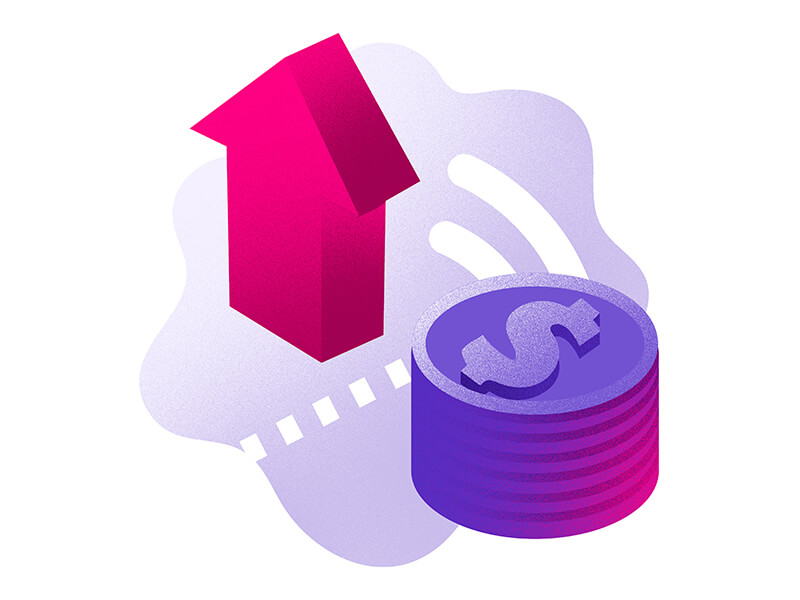Understanding the ins and outs of life insurance is one of those chores that always gets pushed to the bottom of the list. And you’ve probably wondered: Is life insurance even worth it?
If anyone you loved would be placed in financial distress if you were to die unexpectedly, the simple answer is: Yes. There is simply no way to put a dollar value on peace of mind.

Maybe you have enough money put away right now to cover your family’s expenses and financial obligations for decades should you pass away unexpectedly.
But if not, paying a modest premium every month to guarantee your loved ones a large lump sum of tax-free money could be worth it for you.For example, policies offered by Lemonade start from $100,000 and can select coverage as high as the policyholders choose: $500,000, $1,000,000, $5,000,000, or more!, with premiums as little as $8 a month.
If you have expenses like a mortgage, your childrens’ future college education, or other debt that you don’t want to burden your family with, a term life policy is a good bet.
Or let’s say that you are your child’s primary caretaker… if you were to pass, how much would it cost to cover full-time childcare? Do you have enough in your savings account to handle those costs?
But before we decide whether Lemonade’s life insurance policy in particular is right for you, let’s talk about the two main types of life insurance that are out there. (Really want extra credit? We take a much deeper dive into this topic in this guide.)
What are the two main types of life insurance?
There’s term life insurance as well as ‘permanent’ life insurance, which includes what’s known as whole life insurance.
- A term life insurance policy can be cheaper and simpler, and the monthly payments (or ‘premiums’) never change—they’re locked in place.
- A term life insurance policy, as the name suggests, covers a specific period of time (the ‘term’ covered by the policy) and the life insurance company guarantees a tax-free payout (the ‘death benefit’) should you die during that specified period.
Keep in mind: You might be required to get a medical exam before receiving a quote for a life insurance policy through Lemonade.

Also, in order to keep term life insurance inexpensive, insurers often don’t refund premiums should you outlive the time covered by the policy. If you’re still alive, that’s great! But your insurer pays nothing.
Meanwhile, permanent life insurance policies—which include ‘whole life’—essentially guarantee a death benefit whenever you pass on, because they remain active for…well, your whole life. (There are some exceptions, of course, and this is provided that you keep up with your premium payments.)
- Whole life and other permanent life policies offer ways to build additional cash value, either based on a pre-determined interest rate (whole life) or by investing funds in stock markets (variable life).
- Permanent policies like whole life insurance, though, can tend to be much more expensive than term life policies.
Permanent life comes in a number of varieties—for example, in addition to whole life, there’s variable life and universal life policies, as well as variable universal life.
Sound confusing? Well, we won’t argue with you there, which is one of the main reasons Lemonade only offers term life policies.
How do I know which is best for me?
There’s no easy answer to this question. Your best bet is to gather all the facts, and then sit down and think about how they apply to your unique personal situation.

Pros of term life insurance
Simply put, term life insurance can be more affordable, simpler, and less complicated to sign up for. As a result, it’s the type of life insurance policy that Lemonade offers—because we honestly think it’s a solid bet for most people.
With term life insurance, there are fewer moving parts. You have a general idea the coverage amount you want in the case of your passing—enough to cover mortgage payments, car payments, or college tuition, for instance.
And you know exactly what time period you’ll be covered for. Since you set these factors yourself, there’s little risk of buying the wrong policy—it’s tailored to your circumstances. And in that case, you’re more likely to find that term life insurance is worth it for you.
One downside of term life insurance
In term life insurance policies, there is no guaranteed death benefit, which means that in the likely event that you live past your term, there’s no payout, and you’re free to apply for a new policy.
Pros of whole life insurance
With whole life insurance, your beneficiaries are pretty much guaranteed to receive a death benefit when you pass on.
A real bonus for policyholders is that whole life insurance builds cash value over time, in case you need to walk away from the policy at any point.
Cons of whole life insurance
Monthly payments for whole life insurance can be anywhere from five to fifteen times more expensive, year after year, than those for term life insurance. And permanent life insurance can be a very complicated product, with a number of options to choose from.
Also, if you choose to withdraw from the built-up cash value in your whole life insurance policy, there can be penalties. Plus, interest rates may not be comparable to other investment vehicles.
When’s the best time to buy life insurance?
The earlier you buy life insurance, the better.
Look at it from the insurance company’s perspective: The younger you are, the longer you are likely to live, and so, the longer you are likely to pay into a policy.
That makes you cheaper to insure, and so your insurer can give you a better life insurance quote, which is the estimated amount you will pay each month (aka your ‘premium’). With term life offered by Lemonade, you’re locked into that premium when you sign up—it won’t increase over time.
Plus, hopefully, the younger you are, the healthier you are. When someone is healthy, the risk to the insurer is likewise less. They can offer policy holders lower monthly payments, since statistically the odds of a payout are less than if that policy holder was much older.
If no one relies on your income, and you have few or no outstanding financial obligations, you may not need insurance. If you have no dependents and your major life costs are paid off… it might not be necessary.
If you have children who are still dependent on you, but you have a bursting savings account (sweet!), and you know for sure that those funds aren’t going anywhere, maybe they will cover things like college costs and other expenses. In that case, it’s possible you don’t need life insurance.
Or, if you have children but they’re grown and supporting themselves; your mortgage is paid off (congratulations, by the way); and you own your car outright, there also might be no need.
For the rest of us, life insurance is probably a solid bet, and one that your loved ones will be grateful for if anything tragic happens.
Who shouldn’t buy life insurance?
If no one relies on your income, and you have few or no outstanding financial obligations, you may not need insurance. If you have no dependents and your major life costs are paid off… it might not be necessary.
If you have children who are still dependent on you, but you have a bursting savings account (sweet!), and you know for sure that those funds aren’t going anywhere, maybe they will cover things like college costs and other expenses. In that case, it’s possible you don’t need life insurance.
Or, if you have children but they’re grown and supporting themselves; your mortgage is paid off (congratulations, by the way); and you own your car outright, there also might be no need.
For the rest of us, life insurance is probably a solid bet, and one that your loved ones will be grateful for if anything tragic happens.
So, is life insurance a good investment ?
You might still be on the fence, though, and we get it.
It’s tempting to think, ‘Why should I end up paying thousands of dollars in total for a life insurance policy that won’t pay out if I outlive its term?’
This can be hard to wrap your head around: If you do outlive your policy’s term, that’s cause for celebration. But it might also seem like you just threw that money away for the previous years.
Insurance, though, is all about mitigating risk and providing peace of mind. If you think about a policy that might cost as little as $8 a month, which is the lower premium range for Lemonade’s term life offering, the value seems pretty clear.

And our policies can insure you for any amount starting at $100,000 to unlimited, meaning that this is the tax-free amount your loved ones would receive in the event of your passing. (Curious as to how much life insurance you should buy? We’ve got you covered here, with our guide to figuring out the amount of coverage that’s right for you.)
Example of life insurance
We’ve gone through some of the finer, technical points of life insurance, but here’s how life insurance can work in practice:
Meet Max, a 45-year old social worker. Since he has eight years left on his mortgage payment and hefty college tuition payments for his daughter just five years on the horizon, Max wants to help make sure his family has a solid financial future and peace of mind, no matter what. He wisely purchases Lemonade’s life insurance offering, with one million dollars of coverage and a 15-year term. Max always makes his premium payments.
Tragically, Max dies in a sudden accident just six years later. His husband and daughter file a claim as beneficiaries, and receive $1,000,000 from Max’s insurance company. Max gets to leave his family with one last gift: the comfort of financial protection.
Putting it all in context…
Let’s think about a few things you could give up in order to secure permanent peace of mind for your family…
That sweet pair of jeans you were eyeing online? Say they’re $150. If you’re paying $12.50 a month for a term life policy, trade in that pair of jeans for a full year of term life coverage.
A night out with your friends, including dinner and drinks? We’re talking $75. That same amount could cover a few months of coverage toward a policy that could pay out a million dollars or more. (Isn’t it worth trading a hangover and a stomach ache for peace of mind?)
One worst-case scenario with term life insurance is that you find you have to walk away from the policy before your term is up. True, it has no cash value component, so if you walk away, you’ve got nothing. No death, no death benefit. But you’ve likely only been paying a small amount of money a month… so it’s not a major financial loss.

Think of it this way: Say you’re thirty, and you buy a twenty-year policy. Yes, when the clock strikes midnight on your fiftieth birthday, the policy expires, and there’s no death benefit. The upside? You’re still alive. Throw a party with even a fraction of the money you saved compared to a whole life insurance policy, and it will be quite the bash.
And if that doesn’t happen, and you pass before those twenty years are up? In that case, you could give your surviving loved ones financial security from your modestly priced term life insurance policy.
Hopefully we’ve given you plenty of things to consider as you make this very important decision. Think it over, talk to a financial advisor, and come back any time if you’d like to get started with Lemonade.
FAQs
How much does life insurance cost?
Term life insurance policies offered by Lemonade start at as little as $8 a month. But how much you pay for life insurance depends on several factors—including your insurance provider and the type of policy you choose, your age and health status, and your coverage amount and policy term length.
Do you really get money from life insurance?
Yes, your beneficiaries receive a tax-free payout, called a death benefit, from the life insurance policy if you pass away during your policy term. This payout can be used for any purpose, including covering living expenses, debts, or funeral costs.
What are the benefits of life insurance over a savings account?
Life insurance guarantees a significant payout upon death, often surpassing savings account balances. It delivers financial security to beneficiaries tax-free, unlike interest from savings taxed as income. A life insurance policy can also offer living benefits, such as loans against the policy’s cash value, depending on your type of policy, providing financial flexibility not available through traditional savings accounts.
A few quick words, because we <3 our lawyers: This post is general in nature, and any statement in it doesn’t alter the terms, conditions, exclusions, or limitations of policies issued by Lemonade, which differ according to your state of residence. You’re encouraged to discuss your specific circumstances with your own professional advisors. The purpose of this post is merely to provide you with info and insights you can use to make such discussions more productive! Naturally, all comments by, or references to, third parties represent their own views, and Lemonade assumes no responsibility for them. Coverage and discounts may not be available in all states.




